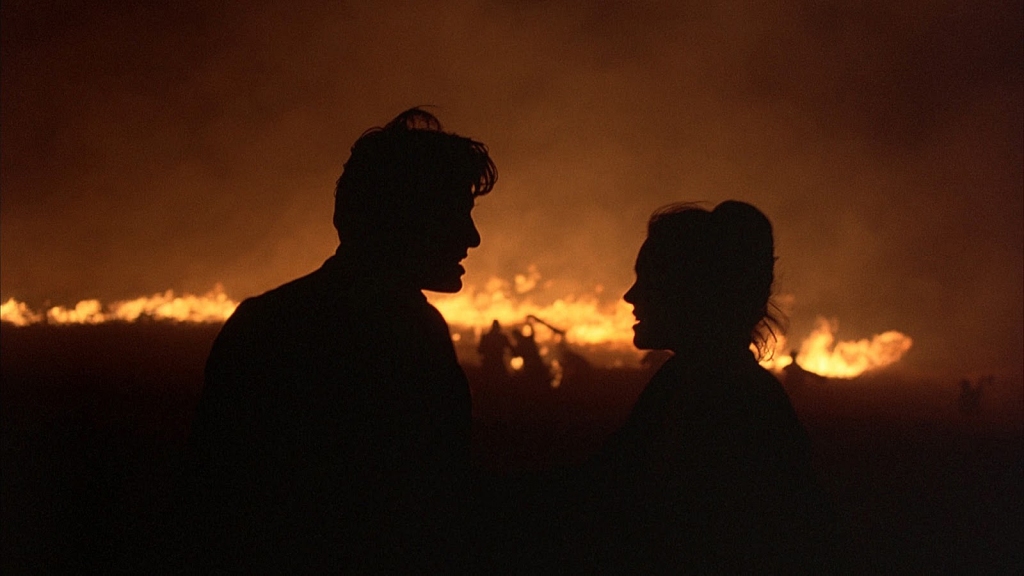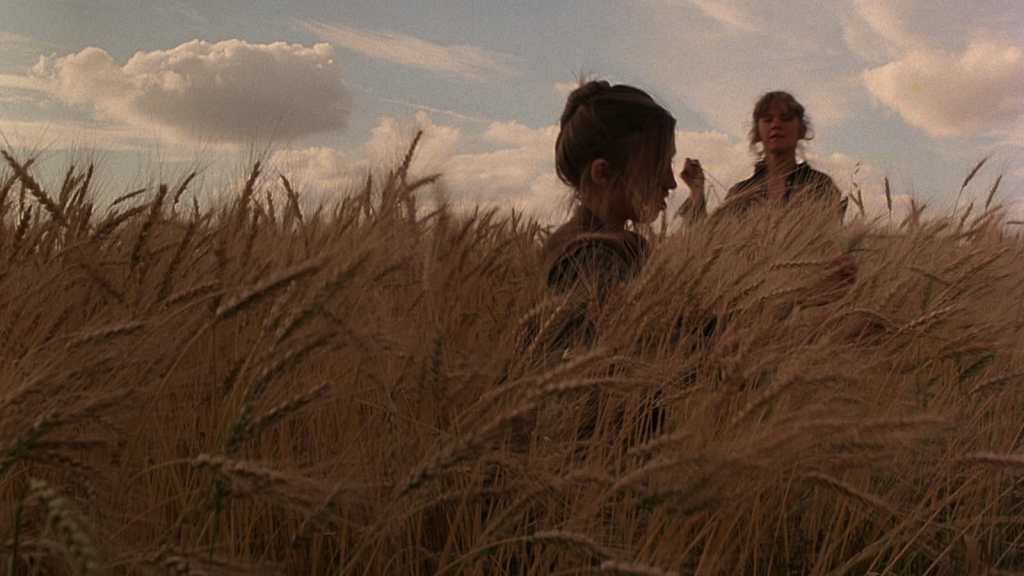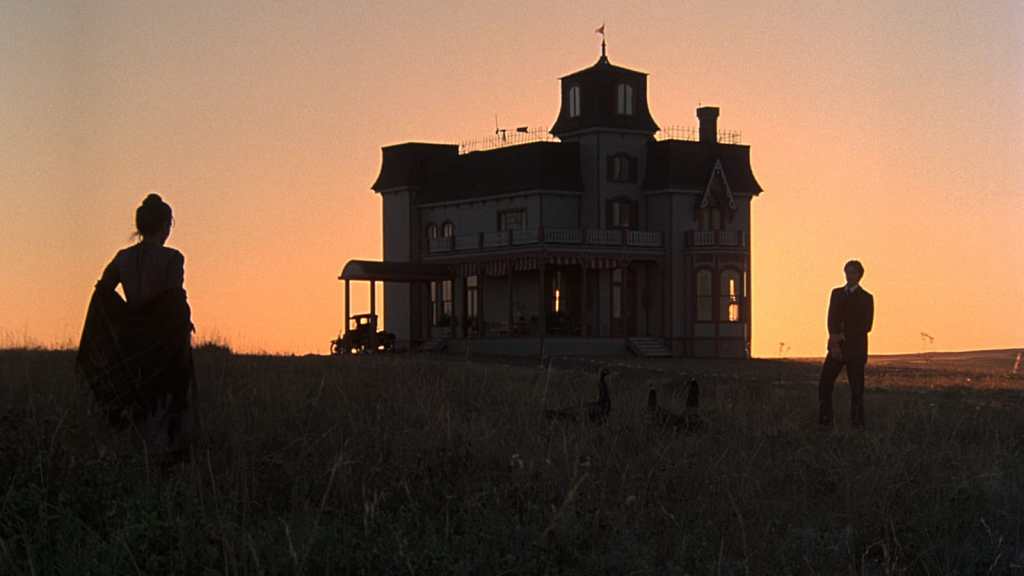“This girl, she didn’t know where she was goin’ — or what she was gonna do.”
Everything comes crashing down on the characters of Days of Heaven in a dramatic way at the start of the film’s final act. Terrence Malick lingers on a close-up of locusts on a head of lettuce as the teenage girl, Linda, cuts vegetables. We see her spot the bugs in a close-up on her face; her expression is a blend of disgust and alarm. The tension in the scene builds through a montage of shots: pheasants squawking as a small swarm begins to hop up from the grass, a detail shot of one of the bugs walking on a handwritten letter and photograph, Abby being startled by a dead locust in her wash basin, an overhead shot of Linda whacking every surface in the kitchen with a fly swatter, ducks outside plucking at the grass…
A farmhand sounds an alarm. Malick holds on a wide shot of the farm at sunset as characters solemnly look up at the sky, locusts swarming in droves around them. At night, the camera circles frenetically around a campfire as men toss buckets of the insects directly into the flames.
The Farmer, aware of Bill and Abby’s plot and betrayal, becomes especially enraged during this chaotic event. His anger sets in motion a fight that lights the fields ablaze. We see Bill and Abby silhouetted against the fire. “He knows,” she says to him, matter-of-factly.
The pheasants fly away from the flames in terror. The next morning, Malick shows us an injured deer running frantically through the ashy field, and a stork standing on the torched earth in seeming disbelief.
When they arrived at the farm about a year prior, Abby, Linda, and Bill entered the property through a dramatic wooden arch. They leave after all of this through that same arch, except at the end of their tenure on the farm, the arch has been destroyed. When they first started working on the farm, Malick intercut scenes of them working with shots of wild bison grazing, pheasants roaming the fields, and other animals living their lives in nature. He brings some back in turmoil after this devastation, and others outright disappear. They have left this place worse off than they found it.
By integrating shots of the creatures that live on the farm in the edit from the start, Malick make us dwell not only on the effect that these characters’ egos and actions have on each other — but on the innocent lives around them that depend on their poise and stability, too.
The tension and release of this sequence comes after The Farmer spotted Bill and Abby — whom he was convinced were brother and sister — kissing from afar. The sequence of locusts and fire comes across as biblical: a natural disaster, worsened by human behavior, that feels like comeuppance for their transgressions.
This calamitous event — and the choices that led to it — steers Abby, Linda, and Bill into the film’s devastating conclusion, which tears their family apart.

We feel the most for the innocent ones. Like the animals in the fields, Linda is affected in entirely unfair ways by the passions and mistakes of the adults around her.
Linda’s extraordinary voiceover narration forms the spine of the film, and gives us insight into what she is thinking and feeling throughout, even if her surface-level words seem not to reveal too much.
When they first arrive at the farm, Linda’s narration is tangential to the story — “I met this guy named Ding Dong. He told me the whole earth is goin’ up in flames.” Her often dark observations are matter-of-fact and do not cast judgment, but the more that we learn and see through her perspective, the more we realize just how difficult a life she has lived thus far.
Then, as Bill and Abby successfully plot to win The Farmer’s favor (and be written into his will), the tone of Linda’s narration shifts: “I mean, we were just, all of a sudden — livin’ like kings. Just nothin’ to do all day but crack jokes, lay around. We didn’t have to work. I’m tellin’ you, the rich got it figured out.” We see her smiling and playing in the fields.
But in the end, after the calamity, Linda’s narration again becomes anxiety-fueled — “I felt like cold hands touching the back of my neck and it could be the dead coming for me or something” — and cynical — “sometimes I’d feel very old, like my whole life is over, like I’m not around no more.”
These shifts in narration subtly communicate a heartbreaking arc. Linda, tough as she is, is still a child, and children need stability in order to flourish. She got her hopes up that the farm could be a comfortable home for her and her family, and then that hope was ripped out from underneath her due to the selfish actions of her caretakers.
What makes her narration all the more poignant, however, is the hopeful optimism that she tries to cling on to even after all of the heartbreak.
“I don’t wait two hours for nobody,” Linda’s disgruntled friend tells her by the railroad tracks of a small town, after having been stood up by her “boyfriend,” in the film’s final scene. “Maybe he don’t have a watch,” Linda replies, without a trace of sarcasm in her voice.
The two of them run off down the tracks, and Linda’s narration concludes the film with a caring sentiment: “This girl, she didn’t know where she was goin’ — or what she was gonna do. She didn’t have no money on her. Maybe she’d meet up with a character. I was hopin’ things would work out for her. She was a good friend of mine.”

Days of Heaven, for all of its drama between Bill, Abby, and The Farmer, is ultimately a story about the havoc that their decisions and circumstances wreaks on Linda, who is innocent of any crimes. Therefore, the relationship drama is stripped of much of its extraneous detail. We experience shifts in the narrative much like Linda would experience them: we notice that The Farmer is eyeing up Abby from afar — “maybe it was the way the wind blew through her hair” — and then, without much additional context, they become a couple. At the beginning of the film, Bill and his supervisor exchange heated dialogue that we can barely hear above the cacophony of the factory in which they work, and then, abruptly, Bill bludgeons the man and runs away. On the farm, Bill overhears a doctor tell The Farmer that he has, perhaps, a year to live — but we don’t see The Farmer’s reaction to this news or linger on the emotion of it; the news merely sets new events in motion.
The plot of Days of Heaven is condensed into fragmented scenes such as this, united by Linda’s narration. As this is Linda’s story, it is right that we do not see all of the drama beneath the surface. Like Linda, and all children, we merely observe flashes of other people’s decisions, and then, seemingly without warning, the entire world changes because of them.

